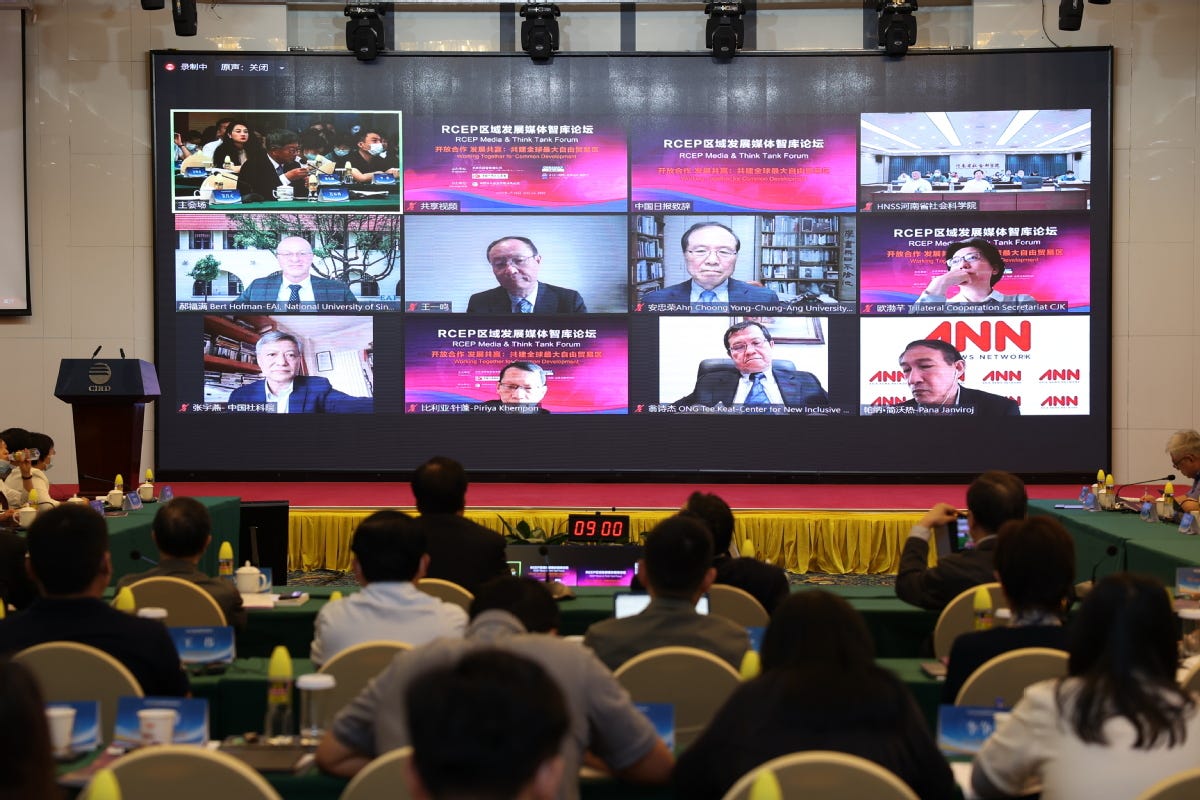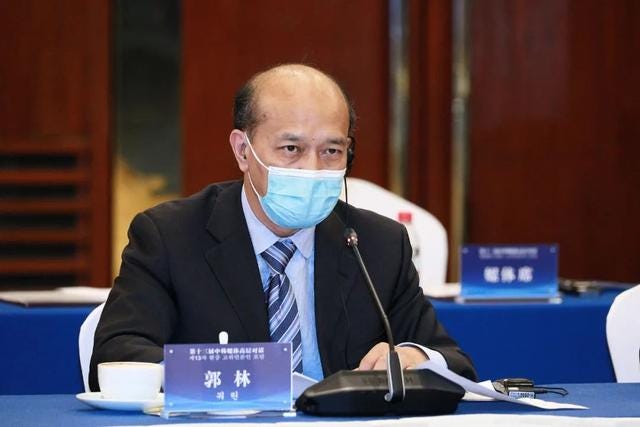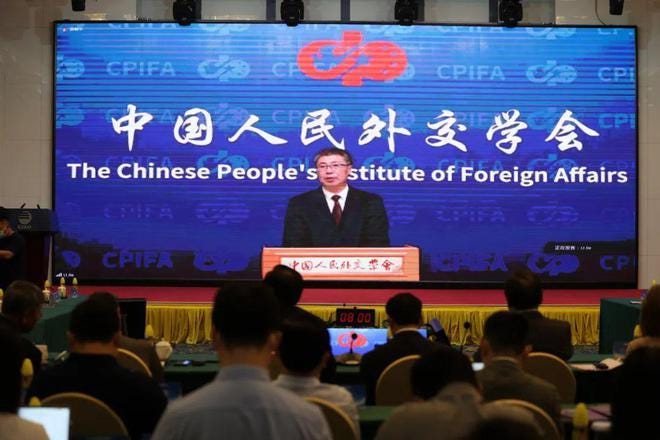Discourse Power | June 2, 2022
Heroes and villains, the times in the Indo-Pacific are a-changin', and everything U.S. can do I can do better
The second RCEP Media & Think Tank Forum was held on Sunday both online and in person in Haikou, Hainan, China's southernmost province off the coasts of Guangdong.
R-what now?
The Regional Comprehensive Economic Partnership (RCEP, pronounced AR-sep) was signed in November 2020 after more than 8 years of negotiations. It is the world's largest free trade agreement, representing about a third of the world's population, economic output and foreign direct investment.
The partnership comprises 15 Asia-Pacific countries: Australia, Brunei, Cambodia, China, Indonesia, Japan, South Korea, Laos, Malaysia, Myanmar, New Zealand, Philippines, Singapore, Thailand, and Vietnam.
The United States is conspicuously missing in action. Chinese discussions of the new trade pact frequently make this point, contrasting it with the Trump administration's decision to abandon the Trans-Pacific Partnership (TPP) in 2017.
The hybrid online-offline RCEP Media & Think Tank Forum was jointly organized by the Publicity (Propaganda) Department of the Communist Party of China’s Hainan Provincial Committee, Party-controlled China Daily, the Chinese People's Institute of Foreign Affairs (CPIFA), and the Hainan-based China Institute for Reform and Development (CIRD).
According to party-state reports, the Forum was intended to bring together diplomats, business leaders, media veterans, and academics from RCEP member countries, the EU, and the US for a series of talks, lectures, and discussions on how to propel the region forward.
A closer look at Chinese-language coverage and pronouncements, on the other hand, reveals a more intricate story - this is a story that celebrates globalization and its champions while clearly defining the antagonists who undermine it.
More on that below, and, as always, thank you for reading,
Tuvia
***
I'll be in New York next week, so Discourse Power will be on a short hiatus.
Top Picks
“The Forum's thunderous response to the "headwinds" facing globalization could be heard even by the deaf!”
In a Chinese-language overview of the RCEP Media & Think Tank Forum (see intro), the Party-run China Daily sets the scene for our story.
Excerpt:
“Pandemics, geopolitical conflicts, rising inflation, and climate change...In 2022, global economic recovery still faces multiple challenges ahead, with protectionism and unilateralism on the rise and economic globalization frequently hitting "headwinds”.
“Some countries are attempting to create exclusive and confrontational "small circles" in order to maximize their own interests. What warrants vigilance is that they not only violate economic laws and market regulations but may also undermine the region's normal economic and trade order.
“In today's world, openness and cooperation are still shaping the trends of our time, and people continue to have faith in mutual benefit and win-win cooperation.” (China Daily)
“The world's current public opinion landscape is in the midst of profound changes. We should let the voices of RCEP countries be heard loud and clear, create our own RCEP narratives, and establish our own discourse”
Mr. Guo Lin, the Director of the International Department of Guangming Daily, another prominent Party-led daily and platform targeted at intellectuals, wants to "tell the story of RCEP well and spread the idea of win-win cooperation to people's hearts."
Excerpts from his keynote speech at the RCEP Media & Think Tank Forum (see intro):
“We, as media, have the responsibility and capacity to speak out, generate consensus, and encourage people to support the RCEP's implementation, strengthen public opinion, and create a favorable public opinion environment.
“China's constant national policy has been to "build friendships and partnerships with neighboring countries" 与邻为善,以邻为伴. On land and in the water, China and RCEP members are interconnected, and exchanges and interactions started by our predecessors go back a long way.
“RCEP has taken root and grown into the world's largest regional trade agreement, involving roughly 30% of the world's population, 30% of global GDP, a quarter of goods and services trade, and 31% of foreign direct investment. Furthermore, [in November 2021], China and ASEAN elevated their relationship to the level of a comprehensive strategic partnership.
“Looking ahead, RCEP's brilliant prospects have the ability to extend far beyond the highest heights of Enlightenment 百尺竿头更进一步 [a Buddhist phrase]. With the foundation we have today and the bright prospects for tomorrow, we can mine a rich mine of great and captivating themes for our publications. But how do we tap into such a vast pool of resources? In order to present the true and positive story of RCEP regional cooperation, I believe the media should begin with the following aspects:
“Gain an understanding of the RCEP's present and future.
a. “RCEP epitomizes multilateralism and economic globalization.
It was signed against the backdrop of rising anti-globalization sentiments and protectionism, illustrating the region's strong commitment to a free, open, and rules-based trading system.
“The partnership's ratification and entry into force sends a powerful message to the region and the world: multilateralism and economic globalization are essential for regional and global economic progress, and exclusion and deliberate "decoupling" would only backfire.
b. “One of RCEP's main draws is its diversity 多元性 - …ASEAN's centrality and leadership role serve as the "anchor" of the initiative; it is diverse and has a more balanced, pragmatic, and inclusive position; it leads interactions that strike a balance between the interests of developing and developed members, bringing as many people on board as possible and striving toward common prosperity 共同繁荣. This stands in contrast to the pursuit of high standards to the point when developed countries bully developing ones.
c. “RCEP benefits all parties significantly, and the path to win-win cooperation and shared prosperity will continue to widen - ...In a nutshell, it brings "real money" 真金白银 to the table and ensures the common prosperity 共同繁荣 of all its members.
Chi Fulin, president of the China Institute for Reform and Development (CIRD), used in his speech the three "is's and will's" formulations that I personally appreciate, namely: RCEP is and will remain the most economically dynamic free trade zone in the world; China is and will remain ASEAN's largest market; openness is and will remain the most important driving force behind RCEP.“Tell the people's stories well - The ultimate goal of the RCEP is for the people of the member countries to benefit from it and improve their well-being.
”To tell the RCEP story well, the media should not only focus on macro-level policies, results, data, projects, and so forth but also focus on the personal stories of the wide range of the actual people who benefit from the agreement.“Pay close attention to how new media can be used to effectively tell the RCEP story well - The advent of the new media of the Internet age has fundamentally altered the way information is disseminated and public opinion is formed.
”New media is quickly becoming the primary means of disseminating information and gaining access to it. In this regard, our respective new media platforms have a lot of room for improvement.
”When many hands gather wood, the flames rise higher" 众人拾柴火焰高, as a Chinese proverb goes. RCEP member countries' media can work together to improve communication and cooperation on new media concepts, technologies, productions, content innovations, communication methods, and operation capabilities, as well as explore, innovate, and enrich the communication and effectiveness of new media.“Explore how we can create our own RCEP narrative together - The world's current public opinion landscape is in the midst of profound changes. We should let the voices of RCEP countries be heard loud and clear, create our own RCEP narratives, and establish our own discourse.
”We must not allow powerful and dominating parties to lead the rhythm 带节奏 and set the tone 定调子 in the international court of public opinion.” (China Daily)
“The world is changing, the times are changing, and the course of human history is changing in unprecedented ways”
In a keynote speech at the RCEP Media & Think Tank Forum, Mr. Qu Yunping, President and Editor-in-Chief of China Daily, paraphrases General Secretary Xi Jinping's ubiquitous slogan from 2018, that "the world today is undergoing major changes unseen in a century."
Full quote:
“At this moment, the world is changing, the times are changing, and the course of human history is changing in unprecedented ways.
“As instability, uncertainty, and insecurity become more prevalent in the global environment, posing severe obstacles to peace and development, the impacts of changes unseen in a century and the once-in-a-century pandemic become intertwined.
“Some countries, in particular, are eager to engage in "small circles," pursuing their own self-interests through economic sanctions, coercion, and other means, casting a pall over the global economic recovery.
“The best way to improve economic development is through openness and cooperation. We must be vigilant, stand on the right side of history*, and fight "anti-globalization" schools of thought and practices.
“We must firmly support economic globalization, encourage deeper interconnectedness, give momentum to regional growth, and work together to build an open global economy.” (China Daily)
[ * ”Standing on the rights side of history” is also a Xi reference, but may also be a retort to US Secretary of State Anthony Blinken's remark that China is "on the wrong side of history" with Russia.]
“The implementation of the RCEP is a milestone for Asia-Pacific economies in opposing anti-globalization and jointly building a unified regional market”
According to former diplomat and vice-president of the Chinese People's Institute of Foreign Affairs (CPIFA), Mr. Li Jie, RCEP is a significant step forward in global trade, liberalization, and investment facilitation, as well as a major victory for multilateralism and free trade.
Quotes from Li’s keynote address:
“RCEP has liberalized more than 90% of goods trade among its members. It has successfully improved the liberalization and facilitation of services and investment trade among its members.
“It has improved the cross-border flow of production units and business information and laid a solid foundation for strengthening intra-regional soft connectivity and creating a unified and open Asia-Pacific market.”
…
“In today's globalized world, all countries, including those in Asia-Pacific, are members of a community of a shared future. All countries' prospects and fates are intertwined, and no country can succeed on its own.
“We must continue to foster practical cooperation based on consensus, resolve disagreements and differences, and steer Asia-Pacific cooperation in the right direction.
“We must continue to carry forward the spirit of Asia-Pacific cooperation of seeking common ground while reserving differences 求同存异 and of achieving harmony without uniformity 和而不同.
“We must all shoulder the responsibilities of our era, make steady progress toward the goal of creating a community of shared future in the Asia-Pacific region, and explore a viable path to facilitate the establishment of a community of shared destiny for mankind.” (China Daily a. | Guangming Daily | China Daily b.)
"America's desire to "eliminate" China from the international stage is nothing but a pipe dream"
Professor Chen Wenling, head economist at the China Center for International Economic Exchanges (CCIEE), believes that China should be confident in the face of US encirclement since it can enhance cooperation across the Indo-Pacific far better than the US.
The last issue of Discourse Power featured a summary of a dozen renowned Chinese experts and scholars, including Prof. Chen, who discussed Sino-US ties in the wake of the Ukraine war.
Here, I wanted to draw attention to her full address (excerpts):
"I once hosted Mr. Wu [Junming], the (then) Singaporean Political Counsellor in China, at the CCIEE. At the getgo, he said: "We are a small country and it is difficult for us to take a stand between the major powers, and supporting China would offend the US while supporting the US would offend [China].
"I told him at the time that the issue between China and the United States is not who is more powerful, but who is defending morality and who is defending hegemony."
“According to Chen Wenling, Singapore's position of not taking sides is a new trend that has evolved amid increased competition among the major powers, emerging as a middle power and balancing force for the international community.
“She stated, "International relations in our day and age do not have the same structure as they did during the Cold War. As long as the majority of countries refuse to choose sides, forming two camps, as was the case during the Cold War, will be difficult, and the world will avoid a new Cold War."
“Instead of rejecting Trump's "political legacy," Biden went even further, identifying China as the US's "most important strategic competitor," promoting various frameworks such as the Indo-Pacific Economic Framework (IPEF), the Quadrilateral Security Dialogue (QUAD), and the Trilateral Security Partnership with Australia and the United Kingdom (AUKUS).
“The essence of these initiatives, according to Chen Wenling, is to push countries to march to America's "drums of war." In areas such as commerce, technology, industrial chains, supply chains, and so on, the US is aiming to "eliminate" 清除 China from the global arena. This is but a pipe dream 异想天开 of some US politicians who have been thinking too much 脑洞大开.
“Ever since the US triggered the trade war and until its ongoing siege of China, almost all countries have not explicitly taken sides. Even those countries who are most firmly associated with the US as "iron-clad allies" do not necessarily benefit from the Sino-US conflict.
“According to Chen Wenling, 149 nations have signed on to China's Belt and Road Initiative (BRI), which has made significant progress. Their confidence in China is substantially higher than their trust in America’s "flowery fanfare" 花架子.
“So, how should China respond to the strategic siege imposed by the United States? According to Chen Wenling, China should not only actively safeguard both sides' common interests in the short term, such as climate cooperation and innovation cooperation, but also be prepared with a long-term strategy for America’s unyielding effort to encircle China and cut it off from supply chains.
“China should tighten its industrial and supply chains, ensuring that they are independent and controllable. It should resist or delay as much as possible its opponents' attempts to cut it off from supply chains and scientific and technological cooperation.
“Chen Wenling also suggested that China should strengthen its ties with various international platforms, such as continuing to promote the BRI, which "has already produced great results and cannot be abandoned halfway like the US [has done with the Trans-Pacific Partnership under Trump]."
“China should vigorously promote the Regional Comprehensive Economic Partnership Agreement (RCEP), "do a better job than the US Indo-Pacific Economic Framework (IPEF), and tighten supply chains."
“Furthermore, China has room for deeper and broader cooperation in multilateral platforms including BRICS, the Shanghai Cooperation Organisation (SCO), and the Association of Southeast Asian Nations (ASEAN).” (RDCY)
[Meanwhile, on the other side of the Indo-Pacific:]


Playing in the Background
Discourse Power is written by Tuvia Gering, a research fellow at the Jerusalem Institute for Strategy and Security and a Krauthammer Fellow, specializing in Chinese security and foreign policy, and emergency and disaster management. Any views expressed in this newsletter, as well as any errors, are solely those of the author.
Follow Tuvia on Twitter @GeringTuvia






